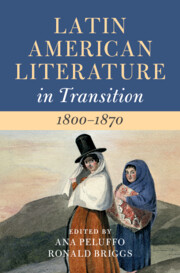Book contents
- Latin American Literature in Transition 1800–1870
- Latin American Literature in Transition
- Latin American Literature in Transition 1800–1870
- Copyright page
- Contents
- Figures
- Contributors
- Acknowledgments
- Introduction
- Part I Aesthetics of Disorder
- Part II Affective Communities
- Part III Intersectional Subjectivities
- Part IV Transoceanic Consciousness
- Chapter 20 Women’s Travel Writing
- Chapter 21 Hydraulic Modernity
- Chapter 22 History and the Transatlantic Imagination
- Chapter 23 Humboldt’s Aesthetic Populations
- Chapter 24 Argentine Darwinists
- Index
- References
Chapter 20 - Women’s Travel Writing
from Part IV - Transoceanic Consciousness
Published online by Cambridge University Press: 24 January 2023
- Latin American Literature in Transition 1800–1870
- Latin American Literature in Transition
- Latin American Literature in Transition 1800–1870
- Copyright page
- Contents
- Figures
- Contributors
- Acknowledgments
- Introduction
- Part I Aesthetics of Disorder
- Part II Affective Communities
- Part III Intersectional Subjectivities
- Part IV Transoceanic Consciousness
- Chapter 20 Women’s Travel Writing
- Chapter 21 Hydraulic Modernity
- Chapter 22 History and the Transatlantic Imagination
- Chapter 23 Humboldt’s Aesthetic Populations
- Chapter 24 Argentine Darwinists
- Index
- References
Summary
Flora Tristan set sail in poverty and through clandestine travel from France to Peru in 1833 while the Peruvian Clorinda Matto embarked as a fully fledged official envoy to Europe in 1908. The contrasting conditions suggest just how much women’s activism had achieved in those drawn-out decades of the nineteenth century. Matto’s accumulation of sufficient cultural capital to be the official representation of the Education Council of Buenos Aires can be viewed as the fruit of hard and sustained labor done by earlier radical women, like Tristan and others, who had committed their lives to political and social change.
- Type
- Chapter
- Information
- Latin American Literature in Transition 1800–1870 , pp. 315 - 328Publisher: Cambridge University PressPrint publication year: 2022



